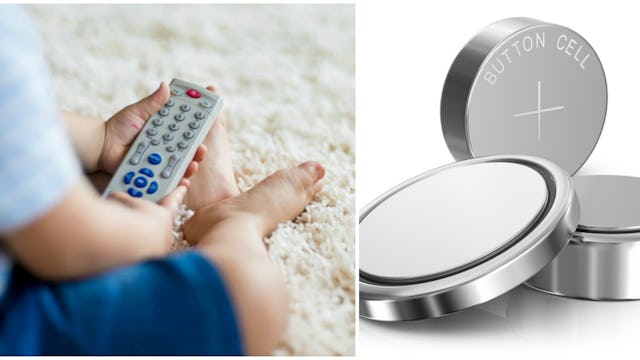If Your Kid Ingests A Button Battery, Call 911. Then Do This.

Flipping button batteries. They’re those slim, metallic, button-sized circle batteries that are in just about every small electronic device in your house – remote controls, thermometers, scales, calculators, cameras, watches, electronic jewelry, holiday ornaments, and every annoying, beeping kid toy on planet earth.
And because they are shiny, about the size and shape of candy, and look oh-so-appetizing, they are a top ingestion danger for little kids. In fact, according to the Academy of American Pediatrics (AAP), 2,500 of these freaking batteries are consumed by kids each year. And the AAP estimates that just about every three hours, a kid lands in the ER for battery ingestion. Freaking scary.
If ingested, these batteries can cause significant issues for little ones, as the AAP explains: “When lodged in the body, the electric current in a button battery rapidly increases the pH of the tissue adjacent to the battery, causing significant tissue injury even within two hours.”
Initial symptoms of ingestion might include signs of common infections, but if not treated some serious consequences can take hold, including, as the AAP describes, “esophageal perforation, mediastinitis, vocal cord paralysis, tracheoesophageal fistula, esophageal stricture, or death caused by a significant hemorrhage of an aortoesophageal fistula.”
Yes — tragically — kids die from ingesting button batteries.
This is very serious business, folks, and is why you should always make sure all electronic equipment with button batteries are childproofed. You can triple tape the battery compartment closed—or even better, try to keep the device totally out of reach of your kid.
But we all know that bad things happen to even the best of people, and that little kids are sometimes just curious beyond belief and can deconstruct even the most baby-proofed device.
So, if you know or suspect that your child has ingested a button battery, you should take them to the Emergency Room ASAFP. Don’t delay—because the more time that progresses, the more likely these serious symptoms can manifest. If you’re unsure, take them anyway, and let the doctors help you eliminate the concern.
It can take a bit of time to get yourself together and get your kid(s) to the ER, and during an emergency every second feels like hours. But there’s some good news: the folks at Children’s Hospital of Philadelphia (CHOP) have come up with a fantastic and proven way to help protect your child while you are waiting to get to the ER or be seen by a doctor.
According to a study presented by the research team at CHOP, it turns out that giving your kid some spoonfuls of honey as you are waiting for them to be seen can protect them from developing some of the most dire symptoms of button battery ingestion. Yes, honey.
(Note: Honey is NOT the treatment. The treatment is calling 911 or heading to the ER immediately, but while you wait for treatment, you feed the child some honey.)
Here’s how honey can protect your child from more serious risk: According to a press release about the study, which was published online in The Laryngoscope, honey can act as “a protective barrier” between your body’s vulnerable tissues and the highly caustic battery. Additionally, honey can serve to “neutralize harsh alkaline levels” that the battery excretes into the body.
This. Is. Awesome.
The researchers used laboratory animals in their testing, and before deciding that honey was the top-choice for protection, they also tested other common beverages that people often keep handy at home, like soda, juice, and sports drinks.
“We explored a variety of common household and medicinal liquid options, and our study showed that honey and sucralfate demonstrated the most protective effects against button battery injury, making the injuries more localized and superficial,” said Kris R. Jatana, Co-Principal Investigator of the study.
So how exactly should you administer the honey if you end up in the awful scenarios of having a child who has consumed a button battery?
“Our recommendation would be for parents and caregivers to give honey at regular intervals before a child is able to reach a hospital, while clinicians in a hospital setting can use sucralfate before removing the battery,” said Dr. Ian N. Jacobs, pediatric otolaryngologist at Children’s Hospital of Philadelphia (CHOP).
There are a few caveats to this practice, of course. The study researchers say that honey should not be consumed in children who have known sepsis or perforation of the esophagus. And of course, any child with a honey allergy should stay away.
How about kids under one year who are told to stay away from honey due to botulism risk? You shouldn’t give them honey in this situation either, according to the researchers.
“While future studies could help establish the ideal volume and frequency for each treatment, we believe that these findings serve as a reasonable benchmark for clinical recommendations,” Jacobs explained. “Safely ingesting any amount of these liquids prior to battery removal is better than doing nothing.”
Yep, it sure is. Anything that can help in this situation should be employed. Again, button battery consumption is not something to brush off. It’s super serious and you should take every measure possible to protect your child.
So, seriously, do your due diligence to keep these batteries out of reach of your kids in the first place, RUSH them to the ER if you even suspect they may have ingested a button battery, and also keep some honey handy and spoon it right into their mouth as you await treatment. It could save their life.
This article was originally published on